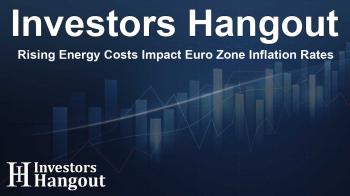Rising Energy Costs Impact Euro Zone Inflation Rates

Understanding Euro Zone Inflation Trends
The Euro zone has recently experienced a notable acceleration in inflation, driven by several economic factors. This increase, anticipated by many analysts, is attributed predominantly to rising energy costs along with stubborn service price increases. While the overall trend in inflation suggests a possible decline in the coming months, the recent uptick raised eyebrows and led to discussions concerning the European Central Bank's (ECB) monetary policy.
Inflation Rates and Economic Indicators
According to Eurostat, inflation across the 20 nations that share the euro rose to 2.4% last month, up from 2.2% in November. This increase aligns with forecasts from economists, indicating a clear relationship between escalating energy costs and broader inflationary pressures within the Euro zone economy. Additionally, the core inflation rate, which excludes volatile sectors like food and energy, remained steady at 2.7%, highlighting persistent price stability issues.
Implications for the European Central Bank's Strategy
The ECB has a set inflation target of around 2%, and while current figures hover just above this goal, the recent spikes raised questions regarding the central bank's strategy in addressing these fluctuations. Throughout the previous year, the ECB implemented multiple interest rate cuts, aiming to support the economy amid ongoing uncertainties. The recent inflation jump adds complexity to these discussions, as the central bank considers its next steps on interest rates.
Consumer Spending and Market Reactions
The acceleration in inflation appears not only in consumer prices but also in consumer sentiment. Surveys conducted by the ECB indicate rising expectations for future inflation, which could dampen consumer spending. As prices continue to climb, consumers may reevaluate their purchasing habits, posing further challenges to the economy.
Cautious Market Outlook
Interestingly, despite the predominant inflation concerns, many market participants are not expecting aggressive rate cuts at every ECB meeting. The current market prediction suggests a significant probability that the ECB may choose to pause rate changes at some upcoming meetings. Investors projected that by the end of the year, the deposit rate could diminish to around 2% from its current standing of 3%. This cautious outlook is influenced by various factors, including recent strength in the dollar, which impacts the cost of imports and, consequently, energy prices.
Labour Market Dynamics and Economic Growth
The labor market is also experiencing shifts, with employment growth slowing considerably. Unemployment rates remained stable at 6.3%, but there are signs of a softening labor market, which could put additional pressure on consumer prices in the long term. Recent wage negotiations are pointing toward a slowdown in income growth, a vital component influencing consumer price changes.
Conclusion: A Balancing Act Ahead
As we assess the challenges posed by rising inflation due to energy costs and other factors, the ECB faces a balancing act of supporting economic growth while managing inflation expectations. The path ahead remains uncertain but understanding these dynamics is crucial for consumers and policymakers alike.
Frequently Asked Questions
What is driving inflation rates in the Euro zone?
Inflation in the Euro zone is primarily driven by rising energy costs along with persistent service price hikes.
How does the ECB plan to handle rising inflation?
The ECB has been implementing interest rate cuts, but the recent inflation spike may lead to a more cautious approach going forward.
What trends are visible in the labor market?
The labor market is showing signs of slowing growth, with stable unemployment rates but reduced hiring activity.
Are consumers changing their spending behaviors?
Yes, increasing inflation rates may lead consumers to adjust their spending habits to accommodate rising prices.
What are the economic implications of a strong dollar?
A strong dollar can increase import costs, which may contribute further to inflationary pressures through higher energy prices.
About Investors Hangout
Investors Hangout is a leading online stock forum for financial discussion and learning, offering a wide range of free tools and resources. It draws in traders of all levels, who exchange market knowledge, investigate trading tactics, and keep an eye on industry developments in real time. Featuring financial articles, stock message boards, quotes, charts, company profiles, and live news updates. Through cooperative learning and a wealth of informational resources, it helps users from novices creating their first portfolios to experts honing their techniques. Join Investors Hangout today: https://investorshangout.com/
Disclaimer: The content of this article is solely for general informational purposes only; it does not represent legal, financial, or investment advice. Investors Hangout does not offer financial advice; the author is not a licensed financial advisor. Consult a qualified advisor before making any financial or investment decisions based on this article. The author's interpretation of publicly available data shapes the opinions presented here; as a result, they should not be taken as advice to purchase, sell, or hold any securities mentioned or any other investments. The author does not guarantee the accuracy, completeness, or timeliness of any material, providing it "as is." Information and market conditions may change; past performance is not indicative of future outcomes. If any of the material offered here is inaccurate, please contact us for corrections.
